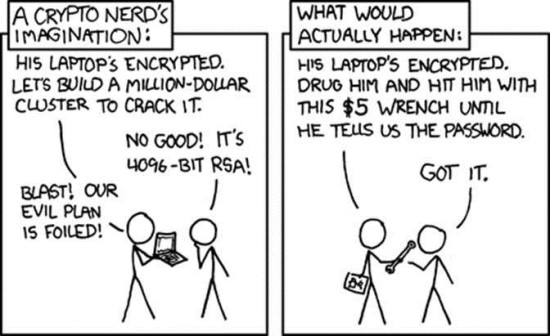Flying spaghetti monsters
Posted on August 5th, 2014 – 1 CommentThe ugly.
Harper’s propensities are a toward building a corporate-fascist tyranny in Canada.
It’s tough to find agreement on just how far Harper’s machinations have progressed, but both his actions and his words repeatedly reassure us that this is precisely what he’s gunning for.
Tyranny, according to the people who coined the word, means “one who rules without law, looks to his own advantage rather than that of his subjects, and uses extreme and cruel tactics—against his own people as well as others”.
The evidence of government tyranny can be found all over TCL — just flip through some old posts.
And fascism, according to both original and modern definitions, is generally defined as, “a form of political behavior marked by obsessive preoccupation with community decline, humiliation, or victimhood and by compensatory cults of unity, energy, and purity, in which a mass-based party of committed nationalist militants, working in uneasy but effective collaboration with traditional elites, abandons democratic liberties and pursues with redemptive violence and without ethical or legal restraints goals of internal cleansing and external expansion.”

Or, if you prefer war-and-oppression-loving Benito Mussolini’s definition: “The Fascist conception of the State is all-embracing; outside of it no human or spiritual values can exist, much less have value. Thus understood, Fascism is totalitarian, and the Fascist State–a synthesis and a unit inclusive of all values–interprets, develops, and potentiates the whole life of a people … Fascism is definitely and absolutely opposed to the doctrines of liberalism, both in the political and economic sphere”.
Lawless and absolute control over economic and societal affairs?
In Canada?
Yes, and it’s obvious: the government is a monopoly that demands absolute obeisance to itself while keeping all of its citizens in debt-bondage to the state (a.k.a. taxes that you “owe” for your entire life and beyond). The vast majority of citizens never agreed to this or its administration; rather, they acquiesced after being threatened with seizure (theft) and jail (kidnapping and imprisonment). Of course, despite the fact that they overtly demand that these are crimes, government flatly rejects any definitions other than that of benevolent benefit when they engage in them. They have to; how could they undermine their own “authority”?

To be fair, Harper didn’t come up with the lie of calling Canada a “democracy” (which it’s simply not), or foisting the apparatus of the state to dominate and control. But he, like most other politicians, engages in stately depravity. He knows that after years of screwing over Canada he’ll be rewarded with a fat pension and lots of gifts from his international buddies for things like looking the other way to systemic human rights abuses. “Important Canadian values” my ass.
What about checks and balances?

Oh, you must be referring to the government-appointed juduciary (or a healthy smattering of corrupt, degenerate, ignorant and incompetent Justices of the Peace), or maybe the equally undemocratic Senate, or maybe the innumerable, undemocratic “authorities” that are imposed on us via the shell game of elections and self-appointed power of the moneyed ruling class.
So the term “fascist tyranny” is not a spurious, knee-jerk reaction or a flimsy propaganda label — it’s a sober definition based on overt deeds.
If it quacks like a duck, as they say.
Okay, so you still don’t like “corporate-fascist tyranny”? Too many memories of Nazi Germany? How exactly could Israel and Canada be such close partners given such strong overtones? How indeed, how indeed.
Very well. So if Harper himself called Canada a “dictatorship” and has been working hard to remove that “benign” prefix from the description, what exactly does that make him? And what does that make Canada?
The bad.
The awful arguments of moral relativism — “at least we’re not as bad as _______!” — imply that anything and everything goes as long as our government doesn’t behave like those animals in other countries.
This means that all that needs to happen is for continuing debasement and destruction of those countries (helped along, of course), for the argument to remain valid. They might behead you arbitrarily over there, so it’s okay for us to torture you here. When they get to doing unspeakable things to children, you being merely beaten and imprisoned for having adult opinions is perfectly acceptable … helluva lot better than what they’d do to you.
Price of freedom, buddy.
![]()
And … AND … terrorism!
Oh yeah…terrorism. Who’s responsible for that again? Surely we need our government to protect us from all those baddies! Okay, so some (unbelievably audacious and fundamentally illegal), abuses might happen, but surely those people will be held to account.
Yeah, surely.
The moral relativist is in most arguments in favour of a race to the bottom, to the very worst crimes and debauchery that humanity can think up — as long as those crimes are slightly better than the other guy’s. The concept of absolute, inhuman control by the fascist state is mirrored in its mindless apologists, along with all the overt lies about your “protection” and “safety” (Terrorism! Crime! Environment! Lefties! Traffic!)
Even if you don’t believe that we’ve arrived at this point, is this what we should be striving for?
Even if you believe that this is merely incompetence, is it logical to depend on the very same people who created and perpetuated these problems for decades/centuries to miraculously fix them?
Okay, I know I’m hammering this topic pretty hard, but only because I absolutely know that the time to take a solid stand is now. The march of corpo-fascism continues across North America and elsewhere, fully promulgated by our “democratically elected” leaders.
All tomorrows are too late.
The good.
The map above is from Norse Corporation’s IPViking Live site where you can see many of the world’s cyber attacks in realtime.
While a map of attacks in the ongoing “cyberwar” (a fear-based buzzword), may seem like utter devastation, it really only shows good old-fashion hack ‘n crack activity with the occasional DDOS attack (nothing more than the target being overwhelmed with too much intentional internet traffic — a very brute-force technique).
In fact, aside from a change in connectivity and some improvements in security, many of the underlying penetration techniques haven’t changed much since I was a pimply-faced, war-dialing teenager.

What the map reveals, however, is that Canada’s internet connection to the world is still somewhat open and unencumbered (net neutrality not withstanding), which is confirmed by the the renewed attention of the copyright goon squad.
Better still, the increasingly brave belief in privacy and anonymity (and moreover simply basic justice), are alive and well in Canada. It is increasingly Canadians who champion truth, justice, and democracy (in the truest sense), around the world.
Take, for example, Montreal’s Subgraph. They come right out of the gate with a firm declaration:
Subgraph is an open source security company.
This means that we believe that open source means the best possible assurance of security at a time when trust is increasingly challenging.
Subgraph takes its inspiration from the domain of cryptography where proprietary algorithms are never trusted, and extends this principle to software.
If a proprietary algorithm cannot be trusted, why trust proprietary, closed-source security software?
I like where they’re going with this. I also like that they’ve taken on the task of creating Subgraph OS and Mail, a much-needed alternative to Tails which is a fully self-contained operating system built around security, privacy, and anonymity that has recently received some skepticism.
Closer to home we find the University of Toronto’s Citizen Lab, a group dedicated more to threat analysis and neutralization rather than the creation of new products (though they sometimes make those too).
Citizen Lab is lead by Ron Deibert who Sarah informs me often carries himself (and is received as) a rockstar, probably because of stuff like this:
…he was sitting on a panel with John Adams, the former chief of the Communications Security Establishment Canada (CSEC), the National Security Agency’s little-known northern ally. Afterward, he recalls, the former spy chief approached and casually remarked that there were people in government who wanted Deibert arrested—and that he was one of them.
…
It’s a bit freaky to hear that,” Deibert said when he recalled the Calgary encounter in an interview with Ars. “When people ask, ‘are you worried about the Chinese or some other adversary out there,’ I say I’m always a bit more worried about my own government, because this is the kind of thing I hear occasionally.”
It’s Citizen Lab’s razor-edge stride between academic rigour, establishment paranoia, and charisma that make it both a formidable force as well as a model for what I think needs to happen, at least in the online world. Increasingly, I believe that Citizen Lab is an example of the type organization that freedom and truth-minded individuals will come to rely on — a group of enlightened individuals who know what time it is.

If you don’t go for these freewheeling hippie types, there are older and more established schools of thought that underscore this entire line of thinking; schools like the Rothbard Insitute, another academic but considerably stuffier organization espousing individual freedom through “radical” economic ideas, and the Mises Institute which runs along similar lines.
On the political front we find groups like the Pirate Party which, despite the malignancies heaped on the name by the corpo-state, is ultimately for individual rights and freedoms:
To describe the goal of the Pirate Party in a single word, I would use “empowerment”. The beauty of the Internet and information technology is the ability for a poor child to have the same opportunities to create change as a wealthy privileged adult. It is the goal of the Pirate Party to encourage that strength, and to promote values which will empower every Canadian.
And if Rothbard or Mises are too rigid for your enjoyment, there are many bright, well-spoken, informed individuals out there that help to bridge the gaps; everything from applicable advice to thought-provoking witticisms.

Complacency and continuing acquiescence are, of course, an option. Going along with or supporting the increasingly fascist state are another. We could also worship the flying spaghetti monster, believe that voting makes a difference, trust that government is working for our benefit, etc.
We have some good examples of how such beliefs work out … maybe it’s time for something different this time?





















